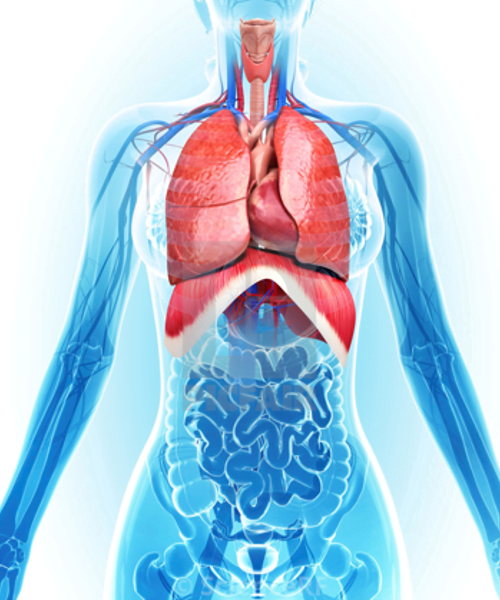
About Respiratory Medicine
Doctors in respiratory medicine diagnose and treat conditions affecting the respiratory (breathing) system, i.e. the nose, throat (pharynx), larynx, the windpipe (trachea), the lungs and the diaphragm.
Nature Of The Work
Traditionally respiratory medicine has been a hospital-based specialty. A third of all acute medical admissions to hospital are the result of respiratory problems, making this a busy and varied role. Respiratory physicians often choose to participate in “medical takes”, where they see patients admitted to Khetarpal hospital with different medical problems. Respiratory physicians may work closely with colleagues in the hospital’s intensive care unit (ICU), providing advice; since so many acute conditions involve respiratory problems.
Assessing patients in outpatient clinics is an important part of the work. There are two types of the clinic: general respiratory clinics and specialist clinics. Patients with asthma and conditions such as chronic obstructive pulmonary disease (COPD) are treated in general clinics. COPD includes chronic bronchitis and chronic obstructive airways disease.
In the general outpatients’ clinics, respiratory physicians also see patients referred by other general practitioners with concerning symptoms such as haemoptysis (coughing up blood) and unexplained breathlessness, or who have abnormal chest x-rays.
Specialist respiratory clinics deal with a range of problems including:
- Cancer
- Tuberculosis, or TB (a bacterial lung disease)
- Cystic fibrosis (an inherited condition that causes a sticky section that can affect the airways often causing an infection)
- Interstitial lung disease (scarring of the lung tissue between and supporting the air sacs)
- Chronic cough
- Sleep disorders relating to breathing, e.g. Obstructive sleep apnoea
- Pulmonary vascular disorders (affecting the blood circulation of the lungs)
Common Procedures/Interventions Include
- Pleural (lung) ultrasound
- Bronchoscopy – examination of the bronchi, the main airways of the lungs, using a thin tube with a light and magnifying lens, known as an endoscope to view the lungs and possibly take a biopsy
- Thoracoscopy – examination of the thoracic cavity using an endoscope
The Techniques Used Include:
- Inserting stents – a thin mesh tube is inserted to keep the airways open
- Endobronchial ultrasound – uses ultrasound and a bronchoscope to examine the airway walls and associated structures for disease
- Thermoplasty – thermal energy is applied to the airway wall to reduce the narrowing that occurs in asthma
- Insertion of indwelling catheters – a soft, flexible tube is placed in the chest under local anaesthesia, to drain fluid from the lungs
FAQs
- What are the types of lung diseases?
The lung and respiratory diseases are categorized into three groups; airway diseases, lung circulation diseases, and lung tissue diseases. The airway diseases are the ones that are caused due to conditions that affect the airways. These include COPD, asthma, and bronchiectasis. Lung circulation diseases affect lungs’ blood vessels as they hamper the ability to take in oxygen and release carbon dioxide.
- What causes cough?
Coughing has a purpose. It is your body’s way of keeping unwanted stuff from getting into your lungs. Coughing helps clear extra mucus from your airways (small tubes in your lungs). This extra mucus could be caused by smoking, a cold, a lung infection or a lung disease, like asthma or COPD.
- How do I know if my cough is normal?
It is normal to cough occasionally. Coughing with a cold, flu or allergies is normal.
Coughing is not normal if you are coughing up blood or thick mucus. If your cough makes you very tired, or light-headed, or causing chest or stomach pain, or causing you to “wet” yourself, you should talk to your doctor to find out the cause.
- How does acid reflux (GERD) cause cough?
GERD is when stomach juice comes up into your esophagus (tube that carries food from your mouth and throat to your stomach). If your stomach juices reach your throat, it can cause irritation and cause you to cough. If you have a cough from GERD you may not have heartburn and your only symptom may be cough.
- Why is important to exercise for patients with COPD?
Exercise has many benefits. First, it decreases shortness of breath and improves your energy level. It also decreases the risk of heart disease, high blood pressure, depression, high blood sugar and side effects from medicine (steroids). Exercise increases bone strength, muscle strength, endurance, relaxation and restful sleep. Overall, exercise will improve your quality of life.
- Will I have to exercise for the rest of my life?
Yes. Regular exercise will become part of your everyday life. Exercise should be considered one of the most effective medications you can take. You will need to exercise four to five times a week for thirty minutes to maintain or improve your current fitness level. Exercise five to six times a week for forty-five to sixty minutes to promote weight loss.

